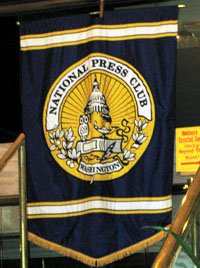 Speakers
share insights on China Speakers
share insights on China
May 2008 - Journalists from around the nation attended a
May 14 workshop, “China and the Olympics: Religion and Human
Rights,” co-sponsored by MU’s Center on Religion & the
Professions. The event, held at The National Press Club in Washington.,
D.C., attracted journalists from both the secular and religious press.
The free seminar aimed to equip journalists for covering issues such
as human rights, religious freedom and the Beijing Olympics - reporting
in China or from the U.S. It featured renowned scholars and experts who
shared tips on framing stories, historical background, trends, finding
sources and adding context when covering this complex and influential
nation.
- Podcasts from “China and the Olympics: Religion and Human
Rights” are available via iTunes.
For help downloading the files, contact Tiffany McCallen at McCallen@RNA.org.
Speakers were:
- Fenggang Yang, associate professor of sociology
at Purdue University who specializes in religious change in China
and its social and political implications. He presented a PowerPoint
on “Religious Trends in China Today And their Social and Political
Implications.”
- Ming Wan, professor of government and politics and
director of the Global Affairs Program at George Mason University.
He is the author of “Human Rights in Chinese Foreign Relations:
Defining and Defending National Interests” and spoke on “China,
Human Rights, and Western Media ‘Bias’ – A Global
Perspective.”
- Robert Thurman, president of the American Institute
of Buddhist Studies and the Tibet House U.S., and the Jey Tsong Khapa
Professor of Indo-Tibetan Buddhist Studies in the Department of Religion
at Columbia University. He is the author of several books, most recently, “Why
the Dalai Lama Matters: His Act of Truth as the Solution for China.” He
spoke on “Tibet and the Dalai Lama.”
- Bob Dietz, Asia Program coordinator for the Committee
to Protect Journalists, which promotes press freedom worldwide and
has published a report on China and the press for the Olympics. He
spoke on press freedom and tips for working as a journalist in China.
- Carol Lee Hamrin, research professor at George
Mason University and senior associate with the Global China Center
in Charlottesville, Va. She specializes in religious rights policy
issues in China and co-edited “God and Caesar in China: Policy
Implications of Church-State Tensions.” She spoke on religious
policy and religious freedom.
- Stephen Angle, associate professor of philosophy
at Wesleyan University. He is the author of “Human Rights and
Chinese Thought: A Cross-Cultural Inquiry” and maintains a web
page on human rights in China. He spoke on the history of human rights
in China and current challenges.
The workshop was co-sponsored with the Religion Newswriters Association
and the Henry Luce Foundation. The Center on Religion & the Professions
is an affiliate of the Missouri School of Journalism at University of
Missouri.
See additional resources on China,
the Olympics, religion and human rights.
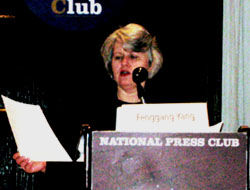 |
 |
| Debra Mason, director of the Center on Religion & the
Professions, introduces speakers at the event. |
Fenggang Yang speaks about religious change in China. |
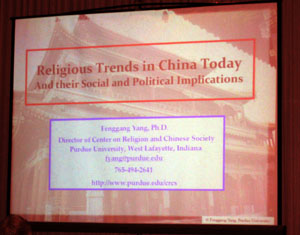 |
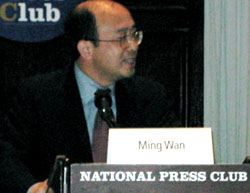 |
| Yang shared extensive information about religious trends
in China and what they may mean for today and the future. |
Ming Wan presents a global perspective on Western media “bias.” |
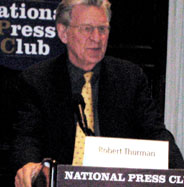 |
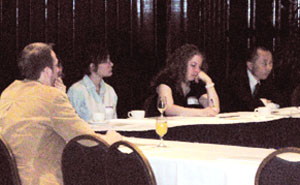 |
| Robert Thurman shares his experiences with the Dalai Lama
and recommendations for resolution in Tibet. |
Journalists from around the country attended the event,
which provided time for questions and to meet the speakers. |
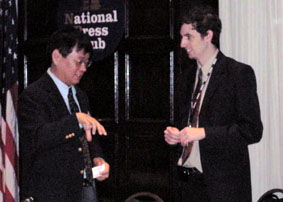 |
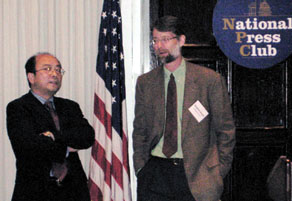 |
| Yang visits with an attendee during a break. |
Wan and Stephen Angle compare notes. |
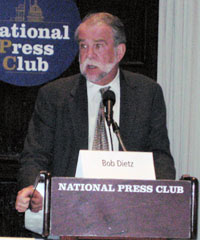 |
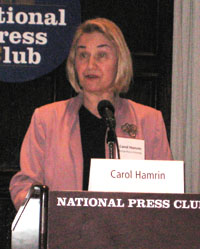 |
| Bob Dietz speaks about the state of press freedom in China. |
Carole Lee Hamrin talks about how Chinese cultural identity
influences religious policy, freedom and responses. |
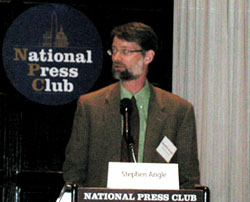 |
|
| Angle summarizes the history of human rights in China compared
to other nations and current challenges. |
|
|